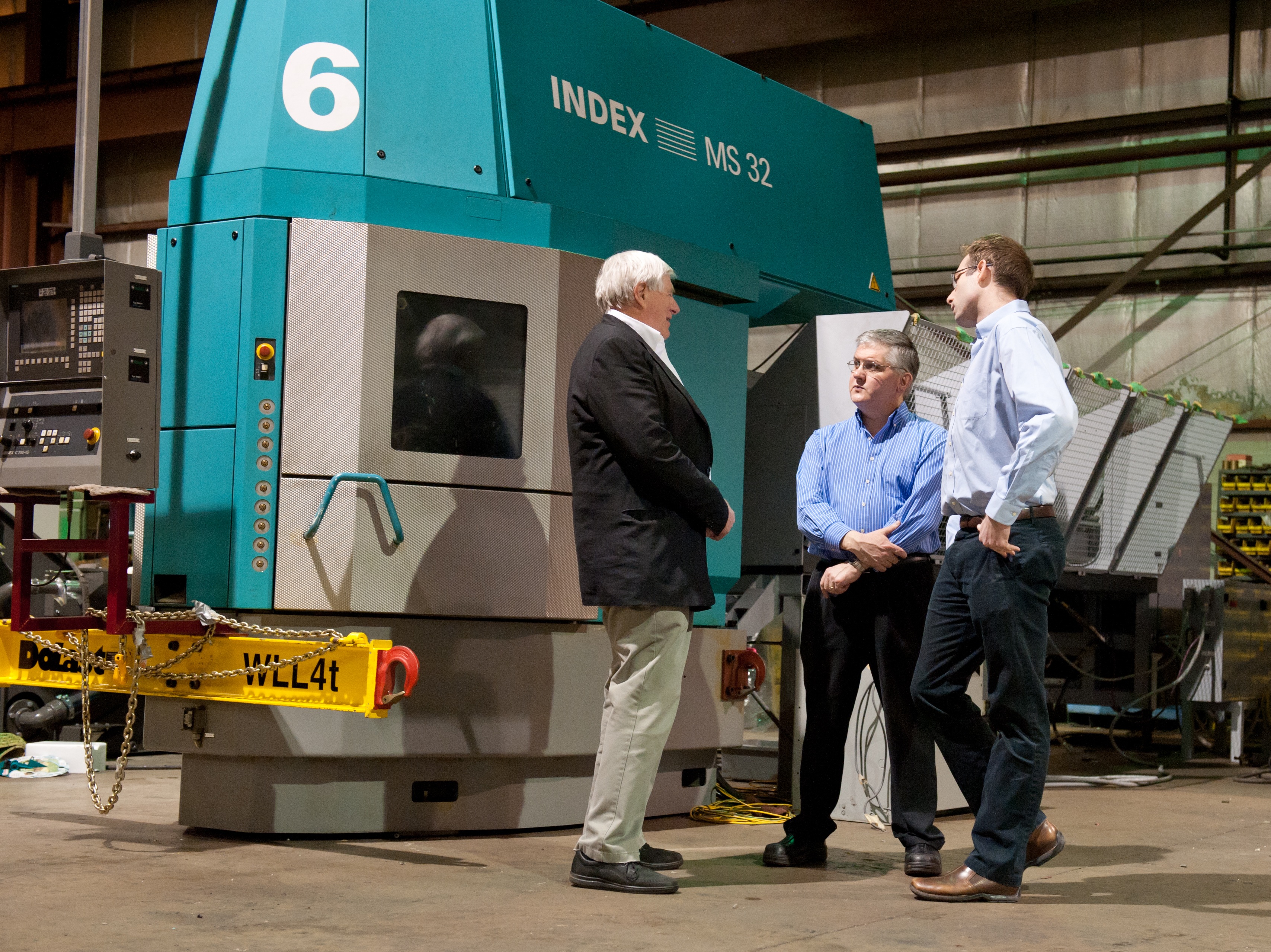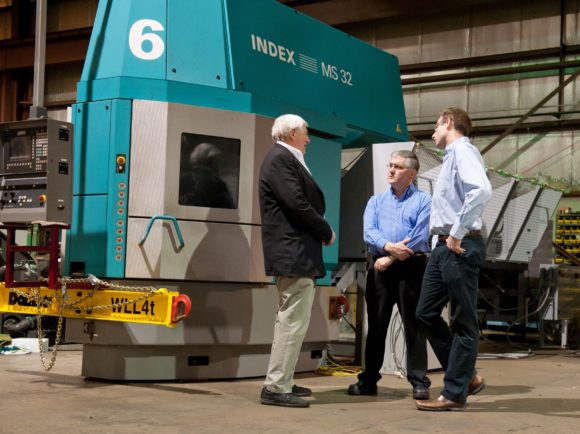
I bought out my brother Jim’s interest in my family machinery business six months ago. I promised him that I would not write about the breakup, but I want to take a few lines to describe how the post breakup is going for me.
The day after our deal closed I was vacationing with my wife, my sister and brother-in-law at the Chautauqua Institution near Jamestown, New York. (We had planned this trip a while before with my sister. That the breakup with Jim culminated at the same time was an odd coincidence.) The four of us were having lunch on the grounds when my iPhone rang and Jim’s name came up. I gulped, walked outside and took the call.
Jim quickly got to the point. There was a deal available with Wickmans and Hydromats. He had already looked at it. He wanted to know if I was interested in buying it. My head spun. Was this déjà vu? Was it 2012 or 2011? We had just broken up a 40-year relationship and now he was calling me to work on a deal?
“Well, uh, yes,” I stammered back. “Sure.” It was a pretty short conversation. This was not exactly how I expected my first day of solo ownership of the family business to go.
I relayed the conversation with Jim to my wife Risa and sister Susan.
They were more perplexed by the timing of the call than I was. There was definitely a business logic to Jim’s call, but the timing was weird after months of negotiating the company’s breakup.
But as I talked about it with my family, my close associate Rex Magagnotti, and son and employee Noah Graff, the new reality of my brother Jim being an “other,” a competitor, but still my brother, who knew me better than most people, started to come into focus.
My company, Graff-Pinkert, ultimately bought the five Wickmans in the deal and sold one of them to Jim. We did not get the plums in the package, the Hydromat rotary transfer machines. But this was my inauguration into the post-split era, where I own the family business, solo, Jim is my competitor, and Rex and Noah are my peers. I used to see Jim most days, now I rarely see him. We talk occasionally, text once in a while, and still deal with our common lawyer on details of the transaction. Actually, business is going quite nicely for me. I will not speculate on how it is for him.
I wish I could say I had a grand plan for the new Graff-Pinkert, post split, but I did not. Long range planning is not my strength. But I knew I wanted to develop Rex and Noah so they would have a more complete grasp of the business and have the confidence to do deals they believed in, while improving the collaborative, creative culture of the company. Without Jim they would have to do more traveling and cultivate their own relationships with clients, suppliers and other members of our team.
After almost dying of heart failure four years earlier, living with impaired vision that was not going to improve and advancing to the age of 68, I knew I was betting on my health and sharpness to be able to make the business successful without Jim. My colleagues seemed to have full faith that we could pull it off – or at least they faked it very nicely.
I made two significant decisions soon after the deal closed with Jim. Rex would go to Australia to bid on several Index multi-spindle lathes, the crème de la crème of screw machines, and Noah would go to the Syndicat International du Décolletage conference in Switzerland, where owners of many of the best screw machine shops in Europe and the U.S. meet and tour the elite shops in the hosting country.
Rex and Noah both understood the potential value of these trips even if they resulted in no tangible business. They both sacrificed their Labor Day plans, seemingly happily, and headed across the oceans.
Australia was the big gamble, because we had never bought an Index multi of the quality and sophistication of the Australian machines. The dismantling and freight costs would be horrific and I had a rather mushy endorsement from my banker on the notion of schlepping to the moon to buy an exotic used machine. I knew the timing was awkward, because I had just done the buyout, but I also knew the timing was perfect to send a message to our clients and our competitors that Graff-Pinkert was pushing ahead aggressively under my leadership and we had the money to do so.
At the exact time Rex was in Melbourne sizing up the Indexes, Noah was talking to many people in Switzerland who ran the machines. The feedback he got in Berne confirmed my belief that we should go all out to buy the machines in Australia.
Rex did his usual thorough job of inspecting the six Index multis, and we decided to bid several hundred thousand dollars for each machine. Despite our large bids, five of the six machines still went for more than we had planned to pay, as they were bought by an Australian user. But when the sixth machine came up, the user decided he had bought all that he needed, enabling us to buy the machine for just slightly more than our intended price. It was a 2007 MS32C, the newest machine at the sale.
I was thrilled. I was scared. Now I had to tell the banker what I had done. I felt exhilarated. I felt alone. I talked to Risa, Rex, Noah and myself about the buy. So this is what it was all about – this being by yourself in business. That was when it really hit me.
A couple of weeks later, my banker told me, “Lloyd, we want to keep a closer eye on you, and we think you are near the limit we want to lend you.” My heart sank. He had arbitrarily cut my credit line almost in half. I was furious and powerless. But we played the game on his terms and finessed our way through the next several months.
We recently sold the Index for a nice profit, despite staggering freight costs to ship it to Chicago from Australia.
I have been more engaged in the machine tool business over the last several months than I have been in a decade. The business has done well. Rex and Noah have grown and developed a close relationship. It has not been smooth. But it never is.
Question: Would you rather be a boss or a highly paid employee?


10 Comments
As a 35 year owner who has just had the worst 4 years in his business life, I can say emphaticly that I would rather be a highly paid employee then an owner.
LLoyd: i did not realize that when we spoke changes were going on in your life and business.I think and hope you have captured some of the excitement of risk,newness,fear and success.I remember when I became president of Dixie Mill,it took me a
while to take full responsibility–no one to blame.The joy of seeing Rex and Noah be successful and proud is worth all the Rubies.Would love to see you and Risa.
I’ll take the “highly paid employee” thank you, um what job was that?
“I felt exhilarated. I felt alone. I talked to Risa, Rex, Noah and myself about the buy. So this is what it was all about – this being by yourself in business. That was when it really hit me.”
This is hard to explain to anyone who has not been in this position, you are lucky if you have a wife and a few close friends to bounce ideas and fears off of, but in the end you make decisions alone. Keep making decisions and pray more are right than wrong.
I think it depends on your personality. There are many people working for others who have the skills to be on their own, they just don’t have the stomach for it. After many years of working for others, I prefer the last 12 years of calling the shots and living with the results. My stomach is just fine.
Lloyd, a boss.
As the boss I would find a new bank.
Banks are like airlines, they like to tell you all they are doing for you.
Treating us a like dogs in the meantime.
I’d still rather be boss…….if the bankers will let me!
Good luck with your “new” endeavor!
I see what the boss goes through and even though I’m a somewhat overwhelmed but highly paid employee. I’ll take it
Peter Schroth – I agree. “This is hard to explain” – I think that’s why not everyone does it, many cannot imagine what it does to your gut to go it alone.
My little corner of the world is a one man corner, and has been for the (37) years I’ve been at it. So, I’m both the boss and the employee. I tell people I work alone because I can’t get along with anybody. Frankly, I love my job, and this work – 24/7! The chip cutting sector of the used machinery business, as opposed to the fabrication sector, has always been a roller coaster. At least for me. My work is my blessing. Not my curse. It’s sustained me and the wife, and from time to time, a number of members of my very large family, that’s found themselves in difficult circumstances. (7 kids. 24 g’kids.)
The Lord takes care of used machinery dealers, and all other dumb animals!